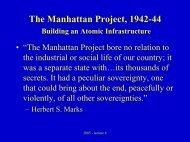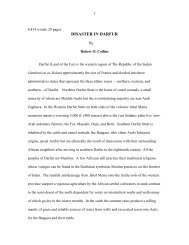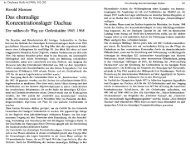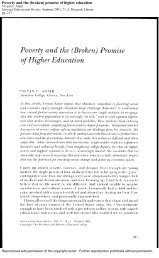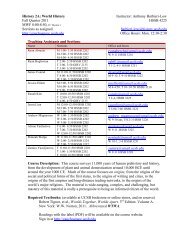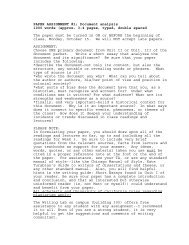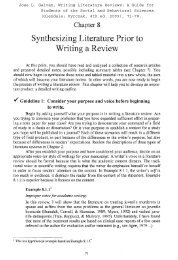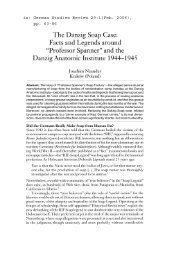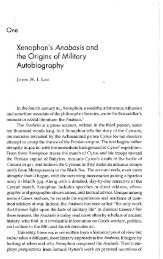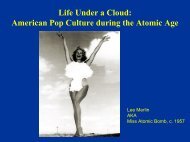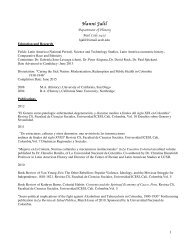An Injury to All - UCSB Department of History
An Injury to All - UCSB Department of History
An Injury to All - UCSB Department of History
Create successful ePaper yourself
Turn your PDF publications into a flip-book with our unique Google optimized e-Paper software.
Joshua Brown
IS CONVENTIONAL TRADE UNIONISM OBSOLETE?<br />
By Stephen Lerner<br />
AN INJURY TO ALL<br />
Going Beyond Collective<br />
Bargaining as We Have<br />
Known It<br />
The hope and optimism <strong>of</strong> the 2008 election is being derailed by economic<br />
meltdown and a legislative process seemingly incapable <strong>of</strong> producing real change. We<br />
entered 2010 with workers having lost trillions in income, homes, and retirement<br />
funds while the banks and corporations that crashed the economy continue <strong>to</strong> use<br />
taxpayer subsidies <strong>to</strong> further consolidate their economic control. The majority <strong>of</strong><br />
union members are in the public sec<strong>to</strong>r at the<br />
very time when states are drowning in hundreds<br />
<strong>of</strong> billions <strong>of</strong> dollars <strong>of</strong> budget deficits.<br />
<strong>An</strong>d if labor and other progressives don’t <strong>of</strong>fer<br />
an alternative, there is a real danger <strong>of</strong> the rightwing<br />
capturing the growing populist anger and<br />
using it <strong>to</strong> attack government’s ability <strong>to</strong> limit<br />
corporate power, and regulate and repair the<br />
economy.<br />
This is the time <strong>to</strong> <strong>of</strong>fer a moral voice for<br />
those devastated by the economic crisis, and <strong>to</strong><br />
have the courage and passion <strong>to</strong> liberate ourselves<br />
from the straitjacket <strong>of</strong> limited expectations.<br />
Unions, and their members, must join with<br />
communities long mired in poverty—and the<br />
tens <strong>of</strong> millions <strong>of</strong> people being forced out <strong>of</strong> the<br />
middle class—<strong>to</strong> imagine and articulate a vision<br />
<strong>of</strong> a better world, and <strong>to</strong> help lead the battle <strong>to</strong><br />
win it. We have the opportunity <strong>to</strong> work with<br />
a growing group <strong>of</strong> potential allies <strong>to</strong> develop a<br />
plan and strategy <strong>to</strong> achieve that vision—but, <strong>to</strong><br />
do so, we have <strong>to</strong> question and challenge long<br />
held assumptions and ideas.<br />
The labor movement in the United States suffers<br />
from a version <strong>of</strong> “the S<strong>to</strong>ckholm Syndrome.”<br />
We have been held hostage for so long by a<br />
messianic free market ideology that we have come<br />
<strong>to</strong> empathize with it and adopt the views <strong>of</strong> our<br />
“kidnappers.” We have been on the defensive<br />
and losing for so long that we have internalized<br />
the idea that the economic system we currently<br />
have is the only one possible, and that the only<br />
progress we can make is modest and incremental<br />
at best. Instead, we have no choice but <strong>to</strong> chart<br />
a fundamentally different course grounded in<br />
the idea that the concentration <strong>of</strong> wealth and<br />
power in the hands <strong>of</strong> a small economic elite and<br />
giant corporations is warping democracy and<br />
undermining the ability <strong>of</strong> the vast majority <strong>of</strong><br />
the people in this country—including workers,<br />
New Labor Forum 19(2): 45-52, Spring 2010<br />
Copyright © Joseph S. Murphy Institute, CUNY<br />
ISSN: 1095-7960/10 print, DOI: 10.4179/NLF.192.0000007
unions, and progressives—<strong>to</strong> organize, bargain,<br />
pass legislation, and make substantive change.<br />
Although we missed an opportunity last<br />
year—<strong>of</strong>fered by the economic collapse <strong>to</strong> organize<br />
against Wall Street, the banks, and giant<br />
multinational corporations—the ongoing economic<br />
crisis and recession continues <strong>to</strong> create<br />
the conditions <strong>to</strong> organize on a far grander scale.<br />
It is precisely in times <strong>of</strong> economic and political<br />
turmoil that movements have been born, and the<br />
radical redistribution <strong>of</strong> wealth and power<br />
becomes possible.<br />
The economic<br />
collapse exposed the<br />
failure <strong>of</strong> the labor<br />
movement’s approach<br />
<strong>to</strong> the economy and<br />
the shortcomings <strong>of</strong><br />
our approaches <strong>to</strong><br />
organizing and<br />
bargaining.<br />
Just as the economic collapse exposed the<br />
fundamental flaws <strong>of</strong> how our economic system<br />
is governed, it also exposed the failure <strong>of</strong> the<br />
labor movement’s approach <strong>to</strong> the economy<br />
and the shortcomings <strong>of</strong> our approaches <strong>to</strong><br />
organizing and bargaining. In the post-World<br />
War II era, labor accepted that corporations<br />
managed their companies and the country’s<br />
economy. Corporations produced pr<strong>of</strong>its and<br />
jobs, and unions played the role <strong>of</strong> a very junior<br />
partner negotiating narrowly on issues <strong>of</strong> wages<br />
and benefits for unionized workers. Labor’s job<br />
was <strong>to</strong> negotiate for a “fair” share <strong>of</strong> an expanding<br />
economic pie for union workers and <strong>to</strong> leave the<br />
rest <strong>to</strong> corporate America. During bargaining,<br />
unions didn’t demand a role in determining how<br />
corporations managed companies, what products<br />
they made, or the quality <strong>of</strong> the services they<br />
provided. Nor did they consider the impact <strong>of</strong><br />
their decisions on the health <strong>of</strong> specific communities<br />
or the overall economy. Unions accepted<br />
the cliché that what was good for business was<br />
good for America. While this produced real<br />
gains for unionized workers in the booming<br />
post-World War II industrial economy, it’s clear<br />
that this model doesn’t work; it is broken and it<br />
isn’t repairable.<br />
<strong>An</strong>y effort <strong>to</strong> address this requires a common<br />
understanding <strong>of</strong> why the current model isn’t<br />
repairable—we have <strong>to</strong> figure out and develop<br />
a visionary and transformative way <strong>to</strong> replace it.<br />
For unions <strong>to</strong> play a role in reshaping how the<br />
economy is organized, we need <strong>to</strong> figure out how<br />
<strong>to</strong> make collective bargaining relevant, launch<br />
organizing campaigns that build movements that<br />
unite workers with the needs <strong>of</strong> their communities,<br />
and—in so doing—challenge the dominance<br />
<strong>of</strong> corporate power and money.<br />
MAKING COLLECTIVE<br />
BARGAINING MATTER<br />
We need <strong>to</strong> politicize, transform,<br />
and rescue collective bargaining<br />
from irrelevance by expanding<br />
its goals <strong>to</strong> address the issues that matter most<br />
<strong>to</strong> workers and <strong>to</strong> the country. Collective bargaining<br />
can’t only be about improving wages<br />
and grievance procedures for union members—<br />
it must also be a <strong>to</strong>ol for fixing broken industries,<br />
creating economic opportunity, and<br />
altering the business practices that exploit<br />
communities and pollute the environment.<br />
Communities and allies must become invested<br />
in workers organizing in<strong>to</strong> unions as a way <strong>to</strong><br />
achieve their own self-interests.<br />
Arguing that—in a moment <strong>of</strong> (perhaps)<br />
our greatest weakness—we should commit ourselves<br />
<strong>to</strong> expanding the scope <strong>of</strong> our demands<br />
46 • New Labor Forum<br />
S. Lerner
uns counter <strong>to</strong> what we’ve done for years; in<br />
moments <strong>of</strong> weakness, we’ve narrowed what<br />
we organize around and fight for. But unions,<br />
collective bargaining, and organizing make less<br />
and less sense the more we narrow the scope<br />
<strong>of</strong> what we are trying <strong>to</strong> achieve. The union<br />
campaigns that show the greatest promise and<br />
make labor relevant are ones that broaden—not<br />
narrow—what we are fighting for.<br />
LAUNCHING LARGE-SCALE<br />
ORGANIZING<br />
Frustrated by limited results,<br />
unions are currently doing less—not<br />
more—organizing, with very few large-scale<br />
organizing campaigns underway. Now is precisely<br />
the time for unions <strong>to</strong> launch large-scale organizing<br />
campaigns, even if there are not immediate<br />
membership gains. Throughout his<strong>to</strong>ry, labor’s<br />
greatest growth and most significant impact<br />
has come when labor is part <strong>of</strong> a broader social<br />
movement. <strong>An</strong>d this growth has come in dramatic<br />
spurts and surges when the energy and momentum<br />
<strong>of</strong> social movements created conditions<br />
that allowed workers <strong>to</strong> overcome the power <strong>of</strong><br />
entrenched business and corporate interests. 1<br />
The explosion <strong>of</strong> union growth starting in<br />
1935 (see Table 1) occurred because unions were<br />
able <strong>to</strong> harness the mass discontent and militancy<br />
coming out <strong>of</strong> the Great Depression. The growth<br />
in union membership provided gains for union<br />
members, but also served as a <strong>to</strong>ol <strong>to</strong> press for<br />
government regulation and programs <strong>to</strong> create a<br />
safety net for all Americans and address broader<br />
social problems. Similarly, the United Farm<br />
Workers and District 1199 (the hospital workers<br />
union that is now part <strong>of</strong> the SEIU) both grew as<br />
a result <strong>of</strong> the civil rights movements <strong>of</strong> the 1960s,<br />
Unions, collective<br />
bargaining, and<br />
organizing make less<br />
and less sense the<br />
more we narrow the<br />
scope <strong>of</strong> what we are<br />
trying <strong>to</strong> achieve.<br />
while simultaneously empowering people <strong>of</strong> color<br />
in their workplaces and in their communities.<br />
While we can’t predict when an organizing surge<br />
will take place, it will only happen if we launch<br />
large-scale organizing campaigns built around<br />
a moral and visionary message that puts union<br />
growth within the mission <strong>of</strong> a broader movement<br />
for social change.<br />
TABLE 1. UNION DENSITY, 1900-1975.<br />
<strong>An</strong> <strong>Injury</strong> <strong>to</strong> <strong>All</strong> New Labor Forum • 47
MAKING CORPORATE<br />
INFLUENCE POLITICALLY<br />
TOXIC<br />
One <strong>of</strong> the hardest lessons <strong>of</strong><br />
2009 has been that—despite all our<br />
efforts—Wall Street, the banks, and<br />
multinational corporations control the legislative<br />
agenda in Washing<strong>to</strong>n. The Supreme Court’s<br />
January 2010 Citizens United decision will further<br />
exacerbate this. Until we make corporate money<br />
and influence peddling <strong>to</strong>xic, it will not be possible<br />
<strong>to</strong> win legislative change that limits the power<br />
<strong>of</strong> Wall Street and corporations <strong>to</strong> manipulate<br />
the economy and tax system <strong>to</strong> their benefit.<br />
We need <strong>to</strong> force legisla<strong>to</strong>rs <strong>to</strong> declare which<br />
side they are on—are they for the people and<br />
communities or for the corporate and banking<br />
interests that created the economic crisis we<br />
face? It must be politically <strong>to</strong>xic for politicians<br />
<strong>to</strong> accept tainted corporate money. This can best<br />
be done in support <strong>of</strong>, and as part <strong>of</strong>, large-scale<br />
organizing and bargaining campaigns that expose<br />
corporate abuse.<br />
This isn’t about what we do on Election Day;<br />
this is what we do every day <strong>to</strong> punish and isolate<br />
specific politicians who take money from those<br />
that destroyed the economy and s<strong>to</strong>le trillions in<br />
workers’ wealth. Later in this article, I will outline<br />
why the finance sec<strong>to</strong>r <strong>of</strong>fers the opportunity <strong>to</strong><br />
launch a campaign with the interrelated goals<br />
<strong>of</strong> organizing bank workers, making Wall Street<br />
money politically <strong>to</strong>xic, and helping <strong>to</strong> reform and<br />
regulate the finance industry. Campaigning in all<br />
three areas at once increases our ability <strong>to</strong> win<br />
those campaigns and build a broader movement<br />
for economic justice.<br />
A HUGE MISSED OPPORTUNITY<br />
TO TRANSFORM THE AUTO<br />
INDUSTRY<br />
Let’s go back a year and a half<br />
when GM, Chrysler, and GMAC Financial<br />
Services went broke and asked for bailouts.<br />
The United Au<strong>to</strong> Workers (UAW) did what many<br />
would do—they decided <strong>to</strong> hunker down <strong>to</strong> try<br />
<strong>to</strong> salvage as much <strong>of</strong> their membership and<br />
their standards as possible. They lined up with<br />
the companies, supported the bailout, and didn’t<br />
<strong>of</strong>fer a vision or concrete proposal about how <strong>to</strong><br />
fix their broken sec<strong>to</strong>r <strong>of</strong> the economy. Instead<br />
<strong>of</strong> challenging the companies’ bad decisions and<br />
mismanagement as the real cause <strong>of</strong> the destruction<br />
<strong>of</strong> the industry, they fought <strong>to</strong> protect their<br />
existing members—a minority <strong>of</strong> all workers in the<br />
industry—and ended up aligned with companies<br />
that are hated and blamed for their own failure.<br />
The results were predictable: huge concessions<br />
in standards, a loss <strong>of</strong> members, and the union<br />
blamed for the industry’s collapse. 2 When the<br />
UAW accepted that union wages would decline<br />
and be pegged <strong>to</strong> nonunion transplant rates, one<br />
<strong>of</strong> the core reasons for workers <strong>to</strong> unionize was<br />
stripped away.<br />
Imagine if, three years ago, the UAW had<br />
instead taken the lead in saying that the au<strong>to</strong><br />
industry was broken; and imagine if the union<br />
had started organizing union and nonunion au<strong>to</strong><br />
workers and environmentalists around a concrete<br />
program <strong>to</strong> fix it. When the crisis hit, what if the<br />
UAW had gone on the <strong>of</strong>fense and asserted its<br />
role as the representative <strong>of</strong> all au<strong>to</strong> workers and<br />
the communities they live in, instead <strong>of</strong> fighting a<br />
defensive and ultimately losing battle <strong>to</strong> maintain<br />
the wages and benefits in the unionized part<br />
<strong>of</strong> the industry? The union could have argued<br />
against $100 billion going blindly <strong>to</strong> specific au<strong>to</strong><br />
companies, and instead proposed that the funds<br />
finance the creation <strong>of</strong> an Au<strong>to</strong> Reconstruction<br />
Agency with full authority <strong>to</strong> restructure and<br />
refinance the industry.<br />
48 • New Labor Forum<br />
S. Lerner
It could have fought for a plan that joined<br />
union and nonunion au<strong>to</strong> workers with environmental<br />
and economic development groups<br />
around a program that called for rebuilding<br />
and recreating the industry at every level, <strong>to</strong><br />
benefit economically struggling communities,<br />
the economic and environmental health <strong>of</strong> the<br />
country, and all workers (union and nonunion).<br />
Instead <strong>of</strong> playing defense, it could have led the<br />
call <strong>to</strong> rebuild the middle class by producing green<br />
cars in America. <strong>An</strong>d if it spoke on behalf <strong>of</strong> all<br />
au<strong>to</strong> workers—and joined with communities<br />
and consumers—it would have positioned itself<br />
<strong>to</strong> reunionize the industry by organizing and<br />
bargaining for all au<strong>to</strong> workers, including parts<br />
suppliers.<br />
What if the UAW had<br />
asserted its role as the<br />
representative <strong>of</strong> all<br />
au<strong>to</strong> workers and the<br />
communities they live<br />
in, instead <strong>of</strong> fighting a<br />
defensive battle <strong>to</strong><br />
maintain the wages<br />
and benefits in the<br />
unionized part <strong>of</strong> the<br />
industry?<br />
As part <strong>of</strong> such a campaign, the union<br />
could have agreed <strong>to</strong> reopen all contracts if the<br />
companies would agree <strong>to</strong> negotiate over an entire<br />
package. Collective bargaining could have become<br />
the vehicle <strong>to</strong> negotiate for green cars, what type <strong>of</strong><br />
cars would be manufactured and where, executive<br />
compensation, wages for outsourced workers, and<br />
how taxpayer bailout money would be used. The<br />
union’s bargaining could have been an avenue <strong>to</strong><br />
expand the manufacturing sec<strong>to</strong>r and strengthen<br />
the communities in which it operates, instead <strong>of</strong><br />
just being a failing attempt <strong>to</strong> protect the declining<br />
number <strong>of</strong> unionized au<strong>to</strong> workers by keeping<br />
companies that plan <strong>to</strong> continue shrinking the<br />
workforce through outsourcing their business. In<br />
short, the union could have united with impacted<br />
communities and used the economic crisis—and<br />
the implosion <strong>of</strong> the Big Three—as a way <strong>to</strong><br />
reorganize, re<strong>to</strong>ol, and reunionize the au<strong>to</strong> sec<strong>to</strong>r.<br />
There is no way <strong>of</strong> knowing if a strategy<br />
based on seizing the moment <strong>of</strong> crisis <strong>to</strong> demand<br />
and win transformational change would have<br />
worked. What we know is that following the<br />
traditional route produced a road <strong>to</strong> shrinking<br />
membership, lower standards, and overall decline.<br />
Throughout the economy, where many<br />
industries—including health care, food processing,<br />
finance, and construction—are facing<br />
significant restructuring, unions face similar<br />
crises and opportunities. The question is whether<br />
we will take steps <strong>to</strong> be ready <strong>to</strong> take advantage<br />
<strong>of</strong> these moments.<br />
CONNECTING<br />
COLLECTIVE BARGAINING<br />
TO THE COMMON GOOD<br />
Expanding the goals and<br />
demands <strong>of</strong> organizing and collective<br />
bargaining is the key <strong>to</strong> winning individual<br />
campaigns, a stronger labor movement,<br />
and a more just society. It isn’t a new idea <strong>to</strong> raise<br />
environmental and other community issues in<br />
campaigns, nor is it new <strong>to</strong> look for support from<br />
allies. What would be new is <strong>to</strong> develop partnerships<br />
with allies who view winning unionization<br />
as a critical piece <strong>of</strong> achieving their goals. One<br />
way <strong>to</strong> do this would be <strong>to</strong> add their demands <strong>to</strong><br />
our collective bargaining demands and have our<br />
partners become part <strong>of</strong> the union’s collective<br />
bargaining committee.<br />
<strong>An</strong> <strong>Injury</strong> <strong>to</strong> <strong>All</strong> New Labor Forum • 49
The ports campaign among truckers and<br />
construction’s Emerald Cities project are two<br />
examples <strong>of</strong> where this kind <strong>of</strong> work is beginning<br />
<strong>to</strong> happen. Food processing and banking are<br />
two more sec<strong>to</strong>rs where it is possible. <strong>An</strong>d, as<br />
health care reform is implemented, the health<br />
care industry <strong>of</strong>fers an incredible opportunity <strong>to</strong><br />
make unionization and industry-wide bargaining<br />
central <strong>to</strong> achieving quality care.<br />
Reducing Air Pollution and<br />
Creating Stable Jobs<br />
The ports campaign has demonstrated that<br />
uniting neighborhoods, environmental groups,<br />
and drivers forced <strong>to</strong> work as independent<br />
“contrac<strong>to</strong>rs” can create a campaign with the<br />
political support and moral authority <strong>to</strong> potentially<br />
restructure an industry, allow unionization,<br />
and address environmental damage caused by<br />
aging polluting trucks. Workers allied with the<br />
International Brotherhood <strong>of</strong> Teamsters—as<br />
There has never been<br />
a better time for<br />
unions <strong>to</strong> be part <strong>of</strong> a<br />
campaign <strong>to</strong> reform<br />
banking.<br />
well as groups like the Sierra Club, the Natural<br />
Resources Defense Council, the Los <strong>An</strong>geles<br />
<strong>All</strong>iance for a New Economy (LAANE), the<br />
American Lung Association, and other unions—<br />
formed a group called the Coalition for Clean<br />
and Safe Ports. The Coalition was united around<br />
the goal <strong>of</strong> changing how port trucking—currently<br />
a system that pollutes neighborhoods<br />
and drives working conditions <strong>to</strong> the lowest<br />
common denomina<strong>to</strong>r—was contracted. The<br />
campaign is about changing the entire system so<br />
that everyone—from workers <strong>to</strong> the surrounding<br />
community—benefits from the new system.<br />
It was only by expanding demands beyond<br />
unionization alone—linking worker organizing<br />
<strong>to</strong> restructuring the owner-opera<strong>to</strong>r system and<br />
cleaning up air pollution in neighborhoods—that<br />
a system previously considered unorganizable<br />
could be challenged and restructured. 3<br />
Green Jobs and Urban Economic<br />
Development<br />
Construction unions, environmental groups,<br />
and economic justice and civil rights groups have<br />
joined <strong>to</strong>gether <strong>to</strong> create good-paying green construction<br />
jobs, working <strong>to</strong> retr<strong>of</strong>it and weatherize<br />
buildings in urban areas. This will allow workers<br />
<strong>to</strong> unionize, create opportunities for workers <strong>of</strong><br />
color long excluded from construction unions,<br />
and raise standards in traditionally nonunion<br />
parts <strong>of</strong> the construction industry, while also<br />
creating more energy-efficient buildings. This<br />
approach is a radical departure for construction<br />
unions, which his<strong>to</strong>rically bargained narrowly for<br />
existing members and supported any unionized<br />
construction project without regard <strong>to</strong> its impact<br />
on surrounding communities. Success in organizing<br />
and bargaining differently in this sec<strong>to</strong>r could<br />
open the door <strong>to</strong> organizing residential and other<br />
nonunion sec<strong>to</strong>rs <strong>of</strong> the construction industry.<br />
Safe Food and Decent Jobs<br />
As mass food production increases and<br />
food safety scandals come <strong>to</strong> light, more people<br />
are growing concerned about how their food is<br />
grown and processed. Seventy-six million people<br />
are sickened—and five thousand are killed—every<br />
year by unsafe food. Imagine the moral power<br />
and public appeal <strong>of</strong> a campaign linking union<br />
representation with specific steps <strong>to</strong> save lives<br />
and improve food safety. What would happen if<br />
the UFCW, farm workers’ unions, and coalitions<br />
<strong>of</strong> food safety advocates (like the Food Safety<br />
Coalition) banded <strong>to</strong>gether <strong>to</strong> demand changes<br />
50 • New Labor Forum<br />
S. Lerner
in food production and insure accountability by<br />
giving workers a voice in the process? The giant<br />
food companies that opposed the effort <strong>to</strong> unionize<br />
would be seen as fighting efforts <strong>to</strong> save lives<br />
and make food safe. Again, it is through making<br />
organizing and collective bargaining central <strong>to</strong> a<br />
safe food supply that we create conditions <strong>to</strong> win<br />
support for legislative and other changes that will<br />
help make worker organizing possible.<br />
We could increase pay<br />
by $2.00 per hour and<br />
provide employer-paid<br />
health insurance for<br />
over 550,000 tellers<br />
with just 3.6 percent <strong>of</strong><br />
the bonuses paid out<br />
<strong>to</strong> executives.<br />
In all <strong>of</strong> these campaigns, there will be<br />
opposition from industry associations who lobby<br />
aggressively against regulation, increase government<br />
subsidies, and oppose efforts <strong>to</strong> reform<br />
their business practices. This makes targeting the<br />
politicians who carry their water both a necessity<br />
and an opportunity <strong>to</strong> challenge the political<br />
power <strong>of</strong> corporations.<br />
PROTECTING CONSUMERS BY<br />
ORGANIZING WORKERS IN THE<br />
FINANCE INDUSTRY<br />
Although we missed an opportunity<br />
in the au<strong>to</strong> industry, we can seize<br />
the opportunity created by the financial<br />
crisis <strong>to</strong> reform and restructure the central core <strong>of</strong><br />
our economy, challenging the political power <strong>of</strong><br />
financial corporations and organizing a completely<br />
nonunion sec<strong>to</strong>r <strong>of</strong> the economy.<br />
There has never been a better time for unions<br />
<strong>to</strong> be part <strong>of</strong> a campaign <strong>to</strong> reform banking. Banks<br />
and Wall Street are hated by everyone—left, right,<br />
and center. They are rightly blamed for getting<br />
rich while crashing the economy and taking<br />
taxpayer bailouts, while continuing <strong>to</strong> award<br />
themselves huge bonuses. Wall Street and banks<br />
that were “<strong>to</strong>o big <strong>to</strong> fail” are now bigger and<br />
more concentrated. There is a growing national<br />
movement calling for breaking up big banks,<br />
protecting consumers, and limiting executive<br />
compensation <strong>to</strong> reform, regulate, and restructure<br />
finance. 4<br />
Banks represent the most extreme example<br />
<strong>of</strong> the unsustainable disparity between those on<br />
<strong>to</strong>p and the rest <strong>of</strong> us. Nothing illustrates this<br />
better than the simple fact that we could increase<br />
The debate about how<br />
best <strong>to</strong> organize the<br />
labor movement has<br />
devolved in<strong>to</strong> a battle<br />
over false choices:<br />
standards vs. growth,<br />
geographically-based<br />
vs. industry-based<br />
organizing, bot<strong>to</strong>m-up<br />
vs. <strong>to</strong>p-down.<br />
pay by $2.00 per hour and provide employer-paid<br />
health insurance for over 550,000 tellers with just<br />
3.6 percent <strong>of</strong> the bonuses paid out <strong>to</strong> executives.<br />
<strong>An</strong> <strong>Injury</strong> <strong>to</strong> <strong>All</strong> New Labor Forum • 51
Increasingly, banks have forced workers<br />
<strong>to</strong> become “sales workers” who push products.<br />
Front-line bank workers—currently under<br />
extreme pressure <strong>to</strong> sell dangerous financial<br />
products—could be part <strong>of</strong> “regulation from<br />
below” if collective bargaining eliminated the<br />
current compensation system that is based on<br />
meeting sales quotas and pushing preda<strong>to</strong>ry<br />
financial products, credit cards, high-fee accounts,<br />
and loans on<strong>to</strong> consumers. This is already happening<br />
in Europe, where finance unions have<br />
demanded such changes, so bank workers’ pay<br />
isn’t based on meeting quotas.<br />
By demonstrating the interrelationship<br />
between deregulation <strong>of</strong> the banks, banks’ abuse<br />
<strong>of</strong> their own workers and consumers, and the<br />
subsequent crash <strong>of</strong> the economy, we can develop<br />
a campaign that captures the imagination <strong>of</strong> an<br />
angry public, challenges the power <strong>of</strong> Wall Street,<br />
and leads <strong>to</strong> substantive fixes for the American<br />
economy.<br />
MOVING BEYOND THE DEBATE<br />
OF FAILED MODELS<br />
The debate about how best <strong>to</strong><br />
organize and develop the labor movement<br />
has devolved in<strong>to</strong> a battle over false<br />
choices: standards vs. growth, geographicallybased<br />
vs. industry-based organizing, bot<strong>to</strong>m-up<br />
vs. <strong>to</strong>p-down. We cannot choose standards over<br />
growth or growth over standards. They are<br />
completely intertwined. We need <strong>to</strong> organize<br />
and build density both geographically—based on<br />
where workers live—and industrially <strong>to</strong> address<br />
corporate power and the realities <strong>of</strong> market<br />
competition. We must build worker power from<br />
the bot<strong>to</strong>m up and pressure companies “<strong>to</strong>p<br />
down.” The lesson <strong>of</strong> recent years is that none <strong>of</strong><br />
these “models” alone—or in combination—work<br />
because they are all, in some way, trying <strong>to</strong> repair<br />
and recreate the now-dead social compact-based<br />
labor relations system <strong>of</strong> the last century.<br />
As private sec<strong>to</strong>r union density has continued<br />
<strong>to</strong> decline over the last twenty years, many<br />
<strong>of</strong> us have argued that hitting 5 percent private<br />
sec<strong>to</strong>r density is the tipping point for when unions<br />
will essentially become powerless. We are quickly<br />
approaching that 5 percent. If we don’t seize<br />
the opportunity <strong>of</strong> the current economic crisis<br />
<strong>to</strong> chart a radically different course—committing<br />
ourselves and our movement <strong>to</strong> organizing<br />
for transformative change—we will sink in<strong>to</strong> a<br />
deserved abyss <strong>of</strong> irrelevance.<br />
Notes<br />
1. Richard B. Freeman, “Spurts in<br />
Union Growth: Defining Moments and<br />
Social Processes,” in The Defining<br />
Moment: The Great Depression and the<br />
American Economy in the Twentieth Century,<br />
Michael D. Bordo, Claudia Goldin,<br />
and Eugene N. White, eds. (Chicago:<br />
University <strong>of</strong> Chicago Press, 1998),<br />
265-296.<br />
2. “Labor Unions See Sharp Slide in<br />
U.S. Public Support,” September 3, 2009<br />
Gallup Poll, available at http://www.<br />
gallup.com/poll/122744/labor-unionssharp-slide-public-support.aspx.<br />
3. The Coalition for Clean and Safe<br />
Ports—an alliance <strong>of</strong> labor, environmental,<br />
and community welfare<br />
groups—came <strong>to</strong>gether <strong>to</strong> encourage<br />
the port industry <strong>to</strong> address its<br />
impacts, particularly those related <strong>to</strong><br />
truck traffic. According <strong>to</strong> Chuck Mack,<br />
National Direc<strong>to</strong>r <strong>of</strong> the Teamsters’<br />
Port Division, which heavily influenced<br />
the campaign, the coalition<br />
was motivated by a shared vision. “We<br />
realized, hey, there’s a series <strong>of</strong> interests<br />
among the stakeholders here,” he<br />
recalled. “We’ve got <strong>to</strong> look at the<br />
problems—security, safety, and air<br />
quality—as all linked <strong>to</strong>gether. The<br />
changes the [Long Beach] port has<br />
made provide a real benefit <strong>to</strong> our<br />
coalition members and the public.”<br />
See http://apolloalliance.org/newapollo-program/<br />
los-angeles-ports-new-trade-is-cleanand-green.<br />
4. Benenson Strategy Group, “Survey<br />
on Financial Reform,” November 12,<br />
2009 (this is a publicly unreleased poll,<br />
conducted for the SEIU).<br />
52 • New Labor Forum<br />
S. Lerner



